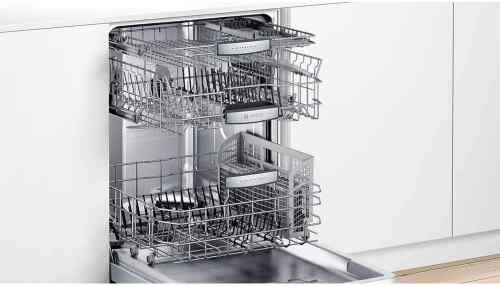Dishwashers have become an indispensable appliance in modern kitchens, offering convenience and efficiency in cleaning dishes. One common question that arises is whether dishwashers need hot water to function effectively. In this article, we will delve into the role of hot water in dishwashers, the impact of cold water on performance, and provide tips for optimal dishwasher usage.
The Functioning of Dishwashers:
Before we discuss the necessity of hot water, it’s essential to understand how dishwashers work. Dishwashers are equipped with a combination of mechanical, electrical, and plumbing components. They use a mix of water, detergent, and various cycles to clean and sanitize dishes.
The Role of Hot Water in Dishwashers:
Hot water plays a crucial role in the cleaning process of dishwashers. It aids in dissolving grease, food particles, and stubborn stains effectively. The high temperature helps to kill bacteria and other microorganisms, ensuring hygienic dishwashing.
Temperature Requirements for Dishwashers:
For optimal performance, dishwashers generally require hot water. The recommended water temperature for most dishwashers is around 120 to 140 degrees Fahrenheit (49 to 60 degrees Celsius). This temperature range ensures efficient cleaning and sanitization while preventing damage to delicate items.
Energy Efficiency Considerations:
While hot water is necessary for effective cleaning, it’s essential to consider energy efficiency. Using excessively hot water can lead to increased energy consumption. Therefore, it’s advisable to follow manufacturer guidelines and balance the temperature requirements with energy-saving considerations.
The Impact of Cold Water on Dishwasher Performance:
Using cold water in dishwashers can have adverse effects on their performance and the cleanliness of your dishes.
- Inadequate Cleaning and Sanitization: Cold water is less effective in dissolving grease and food particles, resulting in subpar cleaning. It may leave residue on dishes, making them appear dull or dirty.
- Stains and Residue Buildup: Cold water may cause stains and residue to accumulate inside the dishwasher. Over time, this buildup can affect the performance of the dishwasher and necessitate maintenance or repairs.
Pros and Cons of Using Hot Water in Dishwashers:
Let’s explore the advantages and drawbacks of using hot water in dishwashers.
Advantages of Hot Water:
- Effective Cleaning: Hot water helps remove tough stains, grease, and food particles efficiently, ensuring sparkling clean dishes.
- Enhanced Sanitization: The high temperature of hot water aids in killing bacteria and germs, ensuring hygienic dishwashing.
Drawbacks of Hot Water:
- Energy Consumption: Using hot water in dishwashers consumes more energy, potentially increasing utility bills.
- Delicate Items: Extremely hot water can damage delicate items like fine china or certain plastics and cause warping, discoloration, or breakage.
Tips for Optimal Dishwasher Performance:
To ensure optimal dishwasher performance, consider the following tips:
- Pre-rinsing and Scrape-off Techniques: Before loading dishes into the dishwasher, scrape off excess food and pre-rinse heavily soiled items. This helps prevent clogs and ensures better cleaning results.
- Water Heating Methods: If your dishwasher doesn’t have a built-in water heater, you can adjust the temperature of the water entering the dishwasher. Make sure to follow manufacturer instructions and set it to the recommended temperature range.
Energy-Saving Techniques for Dishwashers:
To reduce energy consumption while using your dishwasher, implement these energy-saving techniques:
- Using Energy-Efficient Dishwashers: When purchasing a dishwasher, look for models with an Energy Star label. These appliances are designed to be energy-efficient, using less water and electricity without compromising performance.
- Load Optimization and Eco Modes: Optimize your dishwasher’s load by arranging dishes properly, avoiding overcrowding. Utilize the eco mode or energy-saving settings if available, as they use less hot water and electricity during the wash cycle.
Table of Contents
Can I use cold water in my dishwasher?
While cold water can be used in dishwashers, it may result in inadequate cleaning and sanitization. Hot water is recommended for optimal performance.
What is the recommended water temperature for dishwashers?
The recommended water temperature for most dishwashers is between 120 to 140 degrees Fahrenheit (49 to 60 degrees Celsius).
Will using hot water damage delicate dishes?
Extremely hot water can damage delicate items like fine china or certain plastics. It’s important to check the manufacturer’s recommendations and use appropriate water temperature settings.
How can I save energy when using a dishwasher?
You can save energy by using energy-efficient dishwashers with an Energy Star label. Additionally, optimize your dishwasher’s load, utilize eco modes, and follow energy-saving practices.
Should I pre-rinse dishes before loading them into the dishwasher?
Pre-rinsing heavily soiled dishes and scraping off excess food is recommended before loading them into the dishwasher. This helps prevent clogs and ensures better cleaning results.
Conclusion:
In conclusion, hot water is essential for effective dishwashing in most dishwashers. It aids in dissolving grease, removing stains, and ensuring hygienic cleaning. While using hot water consumes more energy, balancing the temperature requirements with energy-saving techniques can help minimize its impact. Remember to follow manufacturer guidelines and optimize your dishwasher’s performance for sparkling clean dishes.

